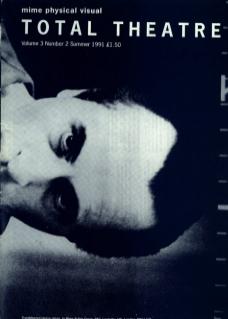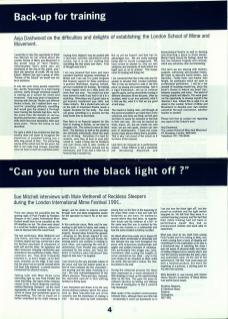I would like to take this opportunity to thank Sue Mitchell for her article about the London School of Mime and Movement in the winter issue of Total Theatre. Unfortunately Sue's name was not mentioned at the end of the article, and I think she deserves all credit. (All my fault, Editor.) Without Sue and a group of other ‘Friends of the School’ we would now not be in existence.
In July last year many people supported me, partly financially in a borrowing scheme, partly through emotional support in setting up a school for mime and movement. I had many years of experience teaching with Animate Theatre and different theatre schools, but I realised there was a need for something different; something that would give the student a thorough basic training like Animate had done, but at the same time the benefit of various teachers/performers sharing the specific skills which they had developed, often over many years. Hence the set-up as Sue described.
For quite a while it has irritated me that this country does not seem to recognise the importance of sustained training over a fairly long period of time. The performing course at the school runs for two years, but that is not really long enough, especially since we have to work on a part-time basis.
Coming from Holland I may be spoiled with a four-year full-time subsidised mime school, but it is not for nothing that something like that exists over there. A lot of thought went into it.
I am very pleased that more and more excellent teachers organise workshops in Britain and I can see it is great progress that financial support for these workshops is granted. Workshops, however brilliant, are not a substitute for training. By training I mean regular work on a daily basis for more than one year. You would not even have learned to walk if you had to do it in a workshop. Workshops are of great value to get inspired, supplement your skills, and make contacts. But a student who sets out on the path of movement theatre needs a regular discipline for the body. The mind can grasp something in a second, but the body needs time to assimilate.
Now there is no financial support for this kind of training in Britain, so we have to struggle a bit. The school is now in its third term. The teachers as well as the students are extremely enthusiastic about the work we are all doing. Sometimes it is hard for students, since they all have to work after school to make a living and so tiredness and even illness sets in after months of long hours. I feel this should not be necessary, and if we had a little bit of financial help it wouldn't be.
But as yet we haven't and that has its advantages too. We are really enjoying being able to create a playground. We have no-one to answer to; only our own ambitions and standards of work (which are high!) spur us on to achieve. This leaves room for playing and trying out.
I am convinced that this is the only way for people to develop their creative potential. This is how we learned to walk in the first place: by playing and experimenting. Not in a rigid framework, set up to achieve specific goals, but by persistently moving in different directions till we discover, often by accident, what is our true potential, what it is that we like, what it is that we are good at and enjoy.
The reward is feeling alive, and through all the personal problems we might have at the school we sure have one thing: we feel alive and there is space for everyone to feel that in their own way. We may be inspired by texts, music, art, but we create our own work, set our own goals, choose our own path of development. I have not come across many places where that is possible. That is why I am proud of the school as it functions at the moment.
Last term we focused on a performance project. Freda O'Byrne did a wonderful job introducing Meyerhold and biomechanical theatre as well as devising and directing a piece in three weeks. Martin Friend shared his findings about the fine line between tragedy and comedy, which was extremely clear and interesting.
This term we are playing with objects, puppets, cartooning and possibly masks. We hope to welcome David Gaines, Julia Bardsley, Faulty Optic and maybe John Wright, for workshops which are open to professional performers. I will do a fair amount of teaching myself too, since this term's theme is where my heart lies: between puppetry and mime. The world of moving people and objects. This work gives me the opportunity to develop myself in the direction I love. Indeed this is what it is all about in the London School of Mime and Movement: to develop your own creative potential through movement, whether teacher or student.

